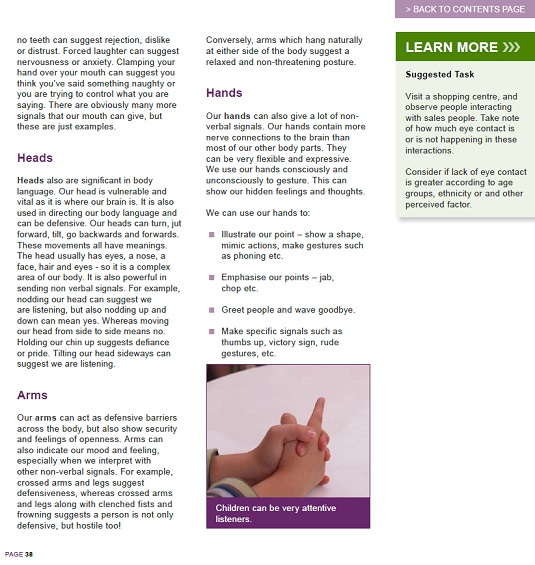This is a self Paced 20-hour course to help you understand more about Counselling Practises.
Counselling skills are needed in many different situations, and this is a course that can set you on the right track to developing such skills.
Counselling happens both formally and informally. Professional counsellors may need a high level of formal training and experience; well beyond what this course can teach you, but counselling happens every day at levels below that. Ordinary people help friends and family get through difficult times. Youth workers, social workers, clerics and undertakers among many other professionals need to practice counselling in their day to day work.
Whatever your situation, this is a great course to start developing your counselling skills.
Our 20 hour courses are self paced and will help you understand a topic in a short amount of time.
Course Content - What do you learn?
 Lesson 1 WHERE CAN COUNSELLING BE USED?
Lesson 1 WHERE CAN COUNSELLING BE USED?
What Are Counselling Skills?
Active Listening
Open Questions
Closed Questions
Paraphrasing
Clarifying/Encouraging
Minimal Encouragers
Silence
Summarising
Reacting
Reflecting
Non-Verbal Communication
Body Language
Electronic Non-Verbal Communication
Empathy
Body Language As Attending Behaviour
SOLER Theory
Influencing Skills
Confrontation
Focusing
Reflection Of Meaning
Consequences
Reframing
Self-Disclosure
Feedback
Advice
Role Of Counselling
Counselling Skills In Different Areas
Personal Relationships
As A Parent
In The Workplace
Teaching
Employer
Work Colleague/Team Member
Health Practitioner
Sales/Marketing
Human Resources
Consulting
Police
Where Can Counsellors Find Work?
Lesson 2 HOW TO SEE BEHIND THE MASK
Defence Mechanisms
Denial
Sublimation
Projection
More On Body Language
Eyes
Mouths
Heads
Arms
Hands
Personal Space
Mirroring
Our Perception Of Others
Trait Theories
Stereotypes
Self-Fulfilling Prophecy
Personal Construct Theory
Primacy Effects and Recency Effects
Halo Effects
Schemas
Scripts
Other Schemas
Attributions
Fundamental Attribution Error
Self-Serving Bias
Locus of Control
Covariance Theory
Lay Epistemology
Are You Stressed?
Post Traumatic Stress Disorder
Treatment of PTSD
Dangers of intervention
Is Stress Always A Bad Thing?
Stress is Good For Us
Lesson 3 EMOTIONS AND ATTITUDES
Emotions
Problems With Subjective Reports
Attitudes
The Range Of Emotions
Love
The Range Of Attitudes
Attitudes And Behaviour
Reasoned Action
Values And Attitudes
Heider’s Balance Theory
Social Judgement And Attitudes
Assimilation And Contrast Theory
Accentuation Theory
Attitude Change
Cognitive Dissonance
Adolescent Crisis
Interventions
Lesson 4 HOW TO COMMUNICATE BETTER WHEN ALL YOU HAVE IS WORDS?
Counselling In Non Face-To-Face Situations
Telephone Counselling
Online Counselling
Other Issues
Case Study – Telephone And Online Help – The Samaritans
Counselling Via Email
Video Communication
Social Implications
Crisis Counselling - Crisis Intervention
“Principles of Crisis Intervention"
Who Provides Crisis Intervention?
Responding to a Crisis - Urgent or Routine?
Lesson 5 THEORY VERSUS PRACTICE
Individual Differences
Client-Centred/Person-Centred (Rogerian) Counselling
Cognitive Behavioural Therapy
Existential Approach
Psychoanalysis
Strength-Based Counselling
Putting Theory Into Practice
Putting Theory Into Practice – Helping A Grieving Child
Case Study – Child X
Grief Counselling
How Do You Deal With Grief?
Depression in Childhood
Review what you have been learning
Lesson 6 DIFFUSING DIFF ICULT SITUATIONS
Timing In Counselling
Case Study: Counsellor Wishes To End Counselling
Case Study: Client Wishes To End Counselling
Some Examples
Diffusing Difficult Situations
Case Study I
Case Study II
Conflict
The Suicidal Client
The Chronically Depressed Client
Anger Management
Understanding and Helping People with an Alcohol Problem

Lesson 7 GOLDEN RULES OR TIPS
Empathy
Respect
Case Study – Euthanasia
Listening
Client’s Wishes And Needs
Case Study I
Case Study II
Understanding Oneself
Focus On Client Strengths
Adhering To Ethical Codes
Competence
Informed Consent
Confidentiality
Balance Of Power
Maintain Professional Boundaries
Multicultural Awareness
Burnout and Debriefing
Relationship and Communication Counselling
Review what you have been learning
WHAT SUPPORT IS AVAILABLE?
As much or little as you need, from qualified psychologists/counsellors and tutors on our help desks in both Australia and the UK
Where Can Counsellors Find Work?
Many trained counsellors have a narrow perspective when it comes to seeking clients; but in reality, counselling skills are in high demand in more places than one might think. If you are prepared to broaden your search for work; your opportunities for career and business success will increase a great deal!
Most qualified counsellors probably work in jobs that utilise their counselling skills; but where they are not actually working purely as a counsellor. Here are some examples:
Human Resources – They may be involved in working with staff, training staff, supporting staff in difficult areas, such as bullying, harassment, redundancies, termination of work and so on. Working in human resources can involve a great understanding of psychology and use of counselling skills within the work place. Human resources work can also involve work in other areas, such as careers counselling, recruitment services and so on.
Sales and Marketing – Marketing psychology is a large area of psychology which aims to tell businesses how to sell and market their goods. For example, the idea of pumping fresh bread smells into the air in supermarkets to make customers hungry was an idea from marketing psychologists. Marketing psychologists will use their understanding of the human mind and marketing to look at the most effective ways to sell products. Knowledge of marketing psychology can also help people to sell their products, decide how to do sales calls, advertise their products, display their products and so on.
Client/Customer Service – Customer and client service can also make use of counselling and psychology knowledge and skills. Client and customer service work involves jobs such as working on a front desk in a hospital, doctor’s receptionist, hotel reception and other reception desks. It can also involve working at help desks etc. When answering the phone or dealing with clients, the staff member may use counselling skills again – active listening, paraphrasing, non-verbal communication and so on.
Care Professionals – Every care professional will utilise counselling skills when dealing with their clients. This is an important part of gaining rapport, trust, and showing the client that you care. There are many different types of care professional work, such as welfare work, social work, youth work, geriatric care, end of life care, nursing, support workers, advocacy workers and more.
Teaching – People may be involved in teaching psychology and counselling, but teachers in other areas will often use counselling skills and psychology skills in their work. Psychology is used to help develop the most effective teaching and learning methods, and to understand the student – where they are at developmentally, what are realistic expectations for the student, how students learn, and so on. Teachers may also utilise counselling skills for behaviour modification, working with students with disabilities, supporting students to work through difficult situations, mediating conflict between students, supporting other teachers, and so on.
Communications – Psychology and counselling skills may be used within media professionals. For example, journalists may make use of counselling skills to get a good interview. Think of good interviewers you have seen on TV and how they may make use of counselling skills. Knowledge of psychology may also be utilised for media releases, and other PR activities to make sure that the best possible image of a business, person, and so on is being portrayed.
Psychologists – Psychologists work in a variety of settings. They may work with children, adults, people with disabilities, people with mental health issues, people with learning disabilities, behaviour modification, addictions, and so on. Psychologists can also work in other areas, such as marketing psychology, industrial psychology, child psychology, ergonomics, sales and marketing.
Police Force/Border control – People working in law enforcement, the police force, border control and other areas also have to work with people in a variety of different ways. They will need skills to manage people’s behaviour, and have knowledge to detect lying, suspicious behaviours, signs of aggression, and so on.
Coaching – Working with people can also involve coaching, such as business coaching, life coaching, sports coaching and in other areas. Coaching is generally to support a person or a business to perform at it’s best – whatever arena it is that they are working on. It uses strategies to set goals, move through obstacles, motivate, provide ongoing support, address issues and so on.
SAMPLE PAGES FROM THE COURSE

Who might Study this Course?
- A starter course for anyone contemplating work in counselling
- Skills Development for health or welfare professionals or anyone working in community services.
- Foundation (Introductory) training for volunteer counsellors (eg. Church organisations, charities)
- Professional Development for anyone working with people, from human resources management to supervisors.
Support from Expert Tutors
You have access to expert tutors through our student help desk all the time you are studying this course. Our school maintains help desks in both of our offices -in Australia and the UK; and has staff on duty five days a week manning phones, online chat and emails. Any questions that you have about what you are studying will be dealt with promptly (usually the same working day, often immediately).
If there is something you read or research that you don't understand, ask for help.
If you want to learn more about something you encounter through these studies, have a conversation with one of our faculty tutors
If you need direction to find more information, ask
If you need advice on moving forward with your work, career or studies after the course ask. (Free career and business advice).
How does this course work?
You can enrol at any time. Once you have paid for the course, you will be able to start straight away. Study when and where you like. Work through at your own pace.
You can download your study-guide to your smart phone, tablet or laptop to read offline.
There are automated self-assessment tests you can complete at the end of each lesson. You can attempt these as many times as you wish and each time, upon completion, you can see your results. You will need internet access to complete the self assessment tests.
At the end of the course, you are presented with a large assessment which can be attempted online, anywhere, anytime. If you achieve a 60% pass in the exam; you immediately receive a downloadable certificate of completion with your name on it. If you do not achieve a 60% pass rate, you can contact us to re-sit your exam. ( email- admin@acs.edu.au )
Contact us at anytime if you have any issues with the course. admin@acs.edu.au